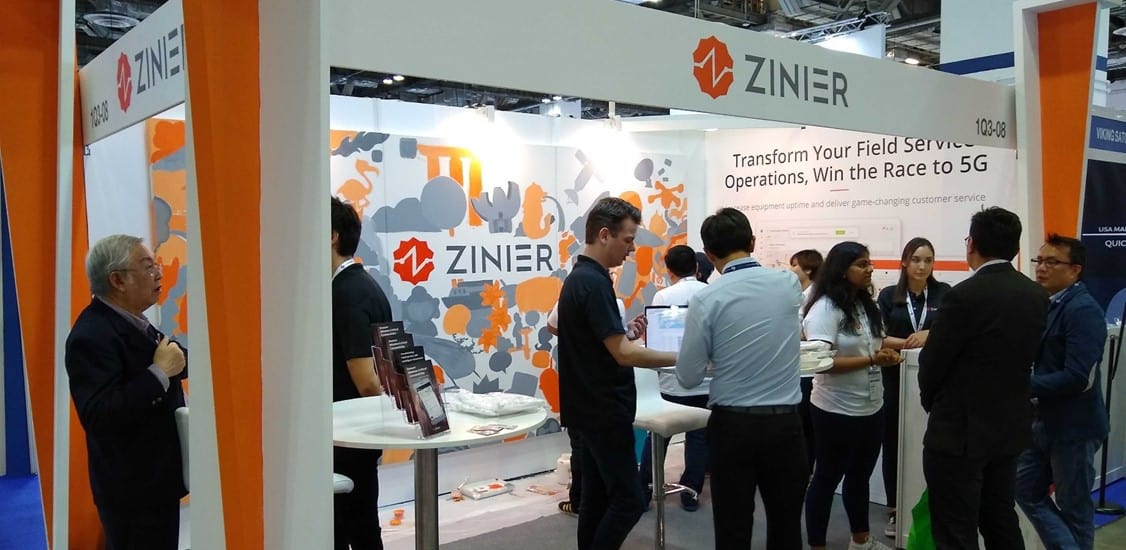In conjunction with the ongoing CommunicAsia 2019 taking place this week in Singapore, Tara Neal, the Executive Editor of The Fast Mode spoke to Nelson Haung, VP of Marketing of Zinier, a startup that is bringing automation to field service management, on a number of topics relating to intelligent automation of field service operations, specifically for the telecommunications industry. The following is the interview.
TARA NEAL:Intelligent automation is changing how enterprises are managing their work processes, their assets and their people, propelled by advances in big data and artificial intelligence and the continuous enhancements in digital and connectivity technologies. Can you elaborate on how intelligent automation is driving value for today’s enterprises and why might more and more players invest in this area?
NELSON HAUNG: Intelligent automation delivers a wealth of invaluable, business-changing benefits for enterprises executing field service operations – including greater productivity and higher levels of customer satisfaction.
 For example, through automation-enabled practices such as just-in-time scheduling, field service organizations can ensure the right resources are always readily available exactly when they are needed – which significantly boosts productivity. Productivity gains are also achieved by field service coordinators and technicians handing off rote, repetitive tasks to intelligent automation – enabling humans to spend their time focusing on complex, more nuanced customer escalations. Resolving escalations is one of the most impactful ways a field service organization can demonstrate value to its customers, which paves the way for higher levels of customer satisfaction.
For example, through automation-enabled practices such as just-in-time scheduling, field service organizations can ensure the right resources are always readily available exactly when they are needed – which significantly boosts productivity. Productivity gains are also achieved by field service coordinators and technicians handing off rote, repetitive tasks to intelligent automation – enabling humans to spend their time focusing on complex, more nuanced customer escalations. Resolving escalations is one of the most impactful ways a field service organization can demonstrate value to its customers, which paves the way for higher levels of customer satisfaction.
Automation, combined with AI, also enables predictive maintenance – which is extremely valuable to field service organizations. Through predictive maintenance, field service organizations can proactively determine which spare parts may be needed to perform a corrective maintenance request. If a device breaks down, AI can examine historical data to predict where the failure likely occurred, and have the technician proactively carry those parts on their truck – instead of needing to visit the site to determine the issue and then return with the right parts. This helps increase first-time fix rate and reduce the number of return calls, which is invaluable in helping maintain customer satisfaction rates.
In fact, there is an argument to be made that upwards of 80 percent of field service operations should be automated … which truly is an unprecedented level of automation.
TARA NEAL: What are some of the industries that you foresee adopting intelligent automation in a major way over the coming years?
NELSON HAUNG: Based on our experience, two industries at the forefront of adoption of intelligent automation are the telecommunications and energy sectors. Whether it’s telecoms gearing up for 5G network deployment or energy companies looking to maintain aging infrastructure, both industries are under immense pressure to work faster without spending more. We’re also seeing significant interest from adjacent industries, including Satellite Communications, ATMs and Point of Sale Systems.
TARA NEAL: With automation, fewer people will be needed to manage field operations, work orders, vendors and enterprise asset maintenance. Would this have an implication on employment? And does automation create alternative opportunities for ‘humans’?
NELSON HAUNG: There is a common misconception that automation will take humans’ jobs. In fact, according to the World Economic Forum's "The Future of Jobs 2018" report, while there will be 75 million jobs taken over by automation by 2022, this will be offset by the creation of 133 million jobs over the same period. This means that automation will actually create a net increase of 58 million jobs, and considering that the field service sector is at the forefront of adoption of automated technologies, a healthy portion of those 58 million new jobs will be in field service.
Also, regarding automation creating alternative opportunities for humans in the field service sector: by handing off rote, repetitive tasks to automated technologies, humans can focus on the complex, more nuanced customer escalations that are best-suited for human beings (rather than machines). Given that escalations are oftentimes high-stakes situations, field service organizations want highly skilled humans - who have the ability to make context-informed decisions that automated machines can’t - focused on these escalations. And with automation taking care of the rote, repetitive tasks previously done by humans, this strategic division of labor is now possible.
TARA NEAL: What do you think will be some of the major topics to be discussed over these 3 days, and what are some of Zinier’s own highlights?
NELSON HAUNG: We expect 5G to be one of the major topics discussed at CommunicAsia/BroadcastAsia 2019, and for good reason: a new report from Ericsson has confirmed that in just five years, nearly half the world will have 5G coverage. While that’s astounding, it means that global telecommunications infrastructure faces a massive accelerated overhaul: receivers will need to be installed, 5G-enabled headsets will need to be serviced, antennas will need to be replaced or upgraded - the list goes on. So we expect many discussions at this event to be focused on what needs to happen, from the infrastructure side of the equation, to make 5G a reality.
At CommunicAsia, Zinier’s highlights include the presentation of two on-stage demonstrations to illustrate how Zinier’s AI-driven platform can use IoT devices to automatically trigger a preventive maintenance work order. The demos focus on use cases for HVAC and tower maintenance, but can be applied to almost any field service-related task.
Additionally, at its booth (#1Q3-08, SatComm Hall, L1), Zinier is presenting five-minute demonstrations of its intelligent field service automation platform, which is purpose-built to enhance field service operations with AI-driven automated processes.






















